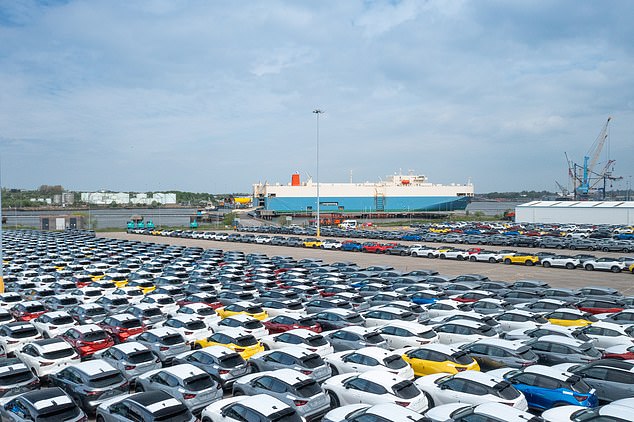Car manufacturer Nissan could be on the brink of collapse with just 12 months to survive, it has been warned.
The Japanese car company, which employs 7,000 people in Britain and 17,000 in the US, has embarked on a massive cost-cutting program after heavy losses.
Nissan said last month it would cut 9,000 jobs and 20 percent of its global production capacity as it works to cut costs by $2.6 billion in the current fiscal year amid a sales slump in China and the US. the two largest markets.
CEO Makoto Uchida will take a 50 percent pay cut and it has now been reported that Chief Financial Officer Stephen Ma is stepping down.
But insiders fear these measures may not be enough as Nissan struggles to stay competitive with rivals that have made more successful progress with popular hybrid cars.
The warnings come as a strategic deal struck in 1999 with rivals Mitsubishi and Renault, covering the European, Japanese and US markets, could end.
Two anonymous ‘senior officials’ at Nissan have been quoted by the Financial times saying that Renault is now considering reducing its financial stake in Nissan.
According to the report, Nissan could therefore need money from the Japanese or US government in the coming year to stay in business.
Japanese carmaker Nissan, which employs 7,000 people in Britain, including 6,000 at its Sunderland factory (pictured), has started an urgent cost-cutting effort
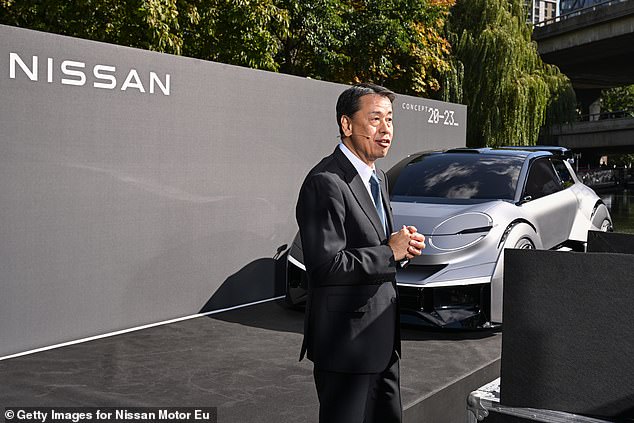
CEO Makoto Uchida, pictured launching Nissan’s Concept 20-23 electric car in London in September 2023, has taken a 50 percent salary cut
The company risks incurring its largest debt burden ever by 2026, with debt potentially reaching as much as $5.6 billion (£4.4 billion), it has been suggested.
The company’s global sales fell 3.8 percent to 1.59 million vehicles in the first half of the current financial year, largely due to a 14.3 percent decline in China.
Nissan has around 7,000 employees in Britain, including 6,000 at the country’s largest car factory in Sunderland.
The Financial Times quoted a ‘senior official’ at Nissan as saying: ‘We have 12 to 14 months to survive. This is going to be difficult. And ultimately we need Japan and the US to generate money.”
Hideyuki Sakamoto, head of production at Nissan, told a press conference last month: ‘We currently have 25 car production lines worldwide. Our current plan is to reduce the operational maximum capacity of these 25 lines by 20 percent.
‘A specific method for this is to change line speed and shift patterns, which increases the efficiency of operational staff.’
And CEO Uchida told reporters: “This is a lesson we have learned and we have failed to move with the times.
“We could not have anticipated that hybrid electric vehicles and plug-in hybrids would be so popular.”
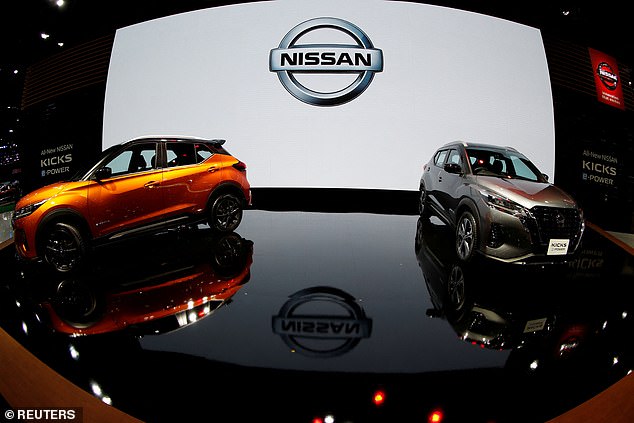
Nissan’s global sales fell 3.8 percent to 1.59 million vehicles in the first half of the current financial year, largely due to a 14.3 percent decline in China
There have been suggestions that Nissan could strengthen ties with Honda, Japan’s second-largest carmaker, which could buy a stake in the smaller company – although sources described this as a ‘last resort’.
Toyota is the largest automaker in both Japan and the world, responsible for about 10 million vehicles a year – compared to Nissan’s 3.4 million.
MailOnline has contacted Nissan for comment on the latest reports.
Meanwhile, Nissan also called for urgent action last month to prevent carmakers from being punished for the slowdown in electric vehicle sales in Britain, which the company blamed on outdated targets in the country’s Zero Emissions Vehicles Mandate.
The mandate forces companies to increase the share of electric vehicles they sell annually until there is a total ban on new gasoline and diesel engines in 2030.
This year, electric vehicles must make up 22 percent of a company’s car sales and 10 percent of van sales, with the threshold rising annually and makers facing a £15,000 fine for each sale beyond that.
Labour’s 2030 target is five years earlier than that of former Tory Prime Minister Rishi Sunak.
And Nissan said missing the target would lead to significant fines for manufacturers unless credits are bought from brands that produce only electric vehicles – none of which are produced in Britain.
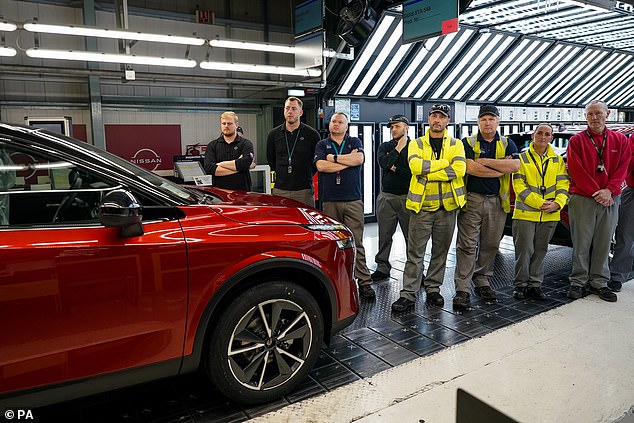
Employees listen as Nissan President and CEO Makoto Uchida spoke at Nissan’s Sunderland plant last year after it confirmed two new types of electric vehicles would be made there
The company called for more flexibility in borrowing credits from future years and a two-year monitoring period for 2024 and 2025 in lieu of possible fines for automakers.
Guillaume Cartier, chairman of Nissan’s Africa, Middle East, India, Europe and Oceania region, said: ‘It threatens to undermine the business case for car manufacturing in Britain, and the viability of thousands of jobs and billions of pounds of investments.
‘We now need to see urgent action from the government by the end of the year to prevent a potentially irreversible impact.’
Manufacturers say they support Net Zero, but a lack of demand for electric vehicles has left companies struggling to make the investment. Many motorists would have been put off by the high prices and a lack of charging points.
Lisa Brankin, the chairman and chief executive of Ford UK, last week called on the government to urgently introduce ‘incentives’, such as tax breaks, to convince motorists to switch from petrol and diesel.
She said: ‘As an industry we have repeatedly said that we support the government’s trajectory and we support the ambition that the government has set out, it’s just that there is no customer demand.’
The Society of Motor Manufacturers and Traders has expressed fears that the pace of the transition could hit carmakers as demand for zero-emission vehicles ‘falls short of ambition’.
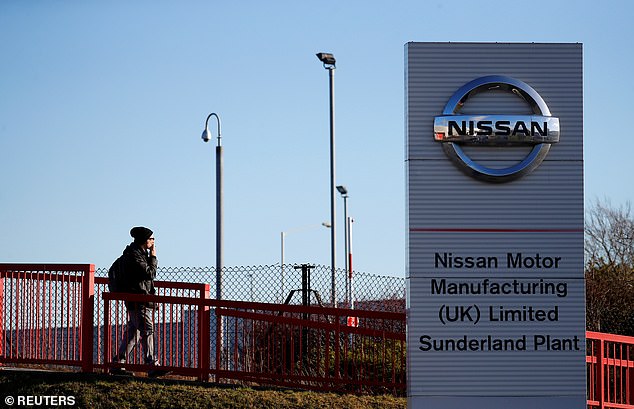
Construction work on Nissan’s Sunderland plant began in 1984 and opened two years later
The organization predicts that a slowdown in consumer demand would result in EV sales reaching just 18.5 percent of the total market, compared to the 2024 ZEV mandate target of 22 percent.
Chancellor Rachel Reeves has said the government will ensure “the right support” for the car industry as it phases out sales of new petrol and diesel vehicles.
She told broadcasters last week: ‘We are committed to the 2030 target of phasing out the purchase of new petrol and diesel cars, but it is very important to ensure we get the right balance and good support for the automotive sector. , for the car industry in Great Britain.
‘We have just launched a consultation to look at the plans that we inherited from the previous government, which would have meant fines for companies that did not sell some of the electric vehicles, because we want to keep the investments, we want to keep the jobs retain. Britain.’

